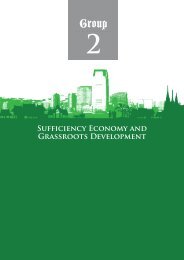Conflict, Legitimacy and Government Reform: Equitable Allocation of ...
Conflict, Legitimacy and Government Reform: Equitable Allocation of ...
Conflict, Legitimacy and Government Reform: Equitable Allocation of ...
You also want an ePaper? Increase the reach of your titles
YUMPU automatically turns print PDFs into web optimized ePapers that Google loves.
Panel Discussion<br />
education, health, wealth, power <strong>and</strong> input into the decision making<br />
process is very much a function <strong>of</strong> where you are born <strong>and</strong> who are your<br />
parents.<br />
In looking at inequalities within countries the case <strong>of</strong> Brazil provides<br />
an illustration which sheds some light on the roots <strong>of</strong> inequality. One<br />
quarter <strong>of</strong> the inequalities in incomes in Brazil in 1996 was found to be<br />
determined by factors completely out <strong>of</strong> control <strong>of</strong> the individual: race,<br />
region <strong>of</strong> birth, parental education <strong>and</strong> paternal occupation at birth.<br />
While we do not have a quantifiable measure <strong>of</strong> their impact, we can<br />
argue that gender, family wealth <strong>and</strong> the quality <strong>of</strong> primary schools, all<br />
factors out <strong>of</strong> control <strong>of</strong> the individual, are also important determinants<br />
<strong>of</strong> power <strong>and</strong> wealth. 2<br />
Compared to inequalities within countries, inequalities across<br />
countries are massive. Cross country differences begin with the<br />
opportunity for life itself: while 7 <strong>of</strong> every 1,000 American babies die in<br />
the first year <strong>of</strong> their lives, 126 <strong>of</strong> every 1,000 Malian babies do. Babies<br />
who survive, not only in Mali but in much <strong>of</strong> Africa <strong>and</strong> in the poorer<br />
countries <strong>of</strong> Asia <strong>and</strong> Latin America, are at much greater nutritional risk<br />
than their counterparts in rich countries. And if they go to school—more<br />
than 400 million adults in developing countries never did—their schools<br />
are substantially worse than those attended by children in Europe, Japan,<br />
or the United States. Given lower school quality, under nutrition, <strong>and</strong><br />
the earnings a child can generate by working instead <strong>of</strong> studying, many<br />
children leave school early. The average person born between 1975 <strong>and</strong><br />
1979 in Sub-Saharan Africa has only 5.4 years <strong>of</strong> schooling. In South<br />
Asia, the figure rises to 6.3 years; in OECD countries, it is 13.4 years.<br />
Opportunities for the consumption <strong>of</strong> private goods differ vastly between<br />
rich <strong>and</strong> poor countries. While the average Nigerian may find it difficult<br />
to afford adequately nutritious meals every day, the average citizen <strong>of</strong><br />
Luxembourg need not worry too much about buying the latest<br />
generation cell phone on the market. 3<br />
2 World Development Report 2006<br />
3 Ibid<br />
91














